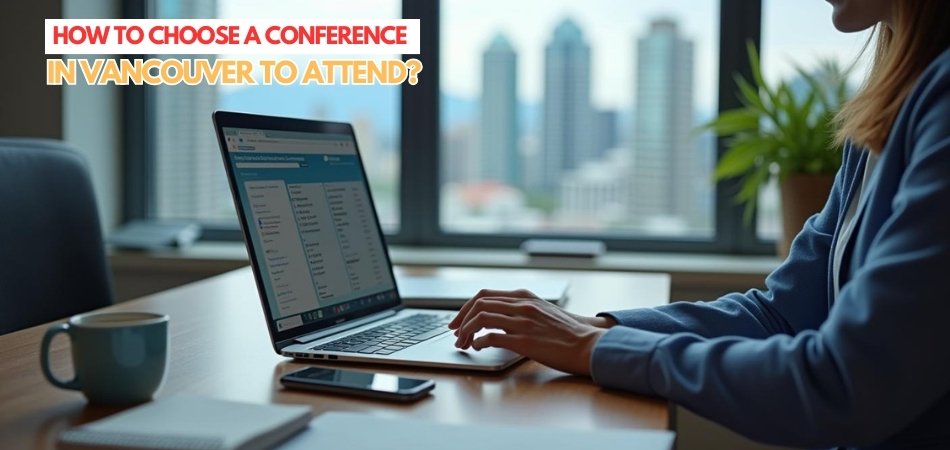Your professional growth can be transformed by choosing and attending the right conference in Vancouver, where you’ll gain valuable insights, make valuable connections, and stay ahead of the competition. But with so many options: How to choose a conference in Vancouver to attend?
To choose a conference in Vancouver, define your goals, research events aligning with your interests, check speakers and topics, check reviews, and consider networking opportunities. For maximum value, make sure the location, schedule, and cost meet your needs.
Want to learn more? Follow this article for actionable tips and make the most of your next conference experience in Vancouver.
How to Choose a Conference in Vancouver to Attend?
The right conference can help you advance your career by providing insight, networking, and skill-building opportunities. With countless options available, finding the perfect conference in Vancouver may seem challenging. Follow this step-by-step guide to simplify your decision-making process:
Step 1: Define Your Objectives
Identify what you hope to achieve from the conference. Whether it’s learning new skills, staying updated on trends, or meeting industry peers, having clear goals will narrow down your options. Focusing on your objectives ensures you choose an event that adds value to your career.
Step 2: Research Upcoming Conferences
Explore various events happening in Vancouver that align with your interests. Check official websites, event directories, or industry forums for detailed information. Focus on conferences with relevant themes, renowned speakers, and interactive sessions. This research will help you create a shortlist of potential events.
Step 3: Evaluate Speakers and Topics
Look into the profiles of keynote speakers and panelists. Are they thought leaders or professionals with expertise in your field? Review the agenda to ensure the topics covered align with your goals. A strong lineup of speakers often indicates a high-quality conference.
Step 4: Read Reviews and Testimonials
Search for feedback from past attendees to gauge the conference’s credibility. Reviews can provide insights into the event’s organization, content quality, and networking opportunities. Look for patterns in the feedback to identify strengths and weaknesses. Reliable testimonials can validate your decision to attend.
Step 5: Consider Networking Opportunities
Evaluate the scope for connecting with like-minded professionals. Conferences often include breakout sessions, networking lounges, and interactive workshops. These settings are ideal for building meaningful relationships and exchanging ideas. Choose events where networking is encouraged and facilitated.
Step 6: Check Practical Details
Ensure the location, schedule, and cost suit your preferences and availability. Consider how the venue’s accessibility and facilities align with your needs. Compare ticket prices and any additional costs to stay within your budget. Practical planning ensures a hassle-free experience.
Step 7: Finalize Your Decision
Make an informed decision based on all the factors-goals, speakers, feedback, and logistics. Prioritize the conference that offers maximum value and aligns closely with your objectives. Trust your instincts and take action to register early. An event chosen well can change your career forever.
In-person or Virtual Conferences: Which is Best for You?
The decision between in-person and virtual conferences depends on your goals, preferences, and circumstances. Both formats offer different benefits and challenges. Listed below is a detailed comparison to help you decide which option is best suited to your needs:
| Factor | In-Person Conferences | Virtual Conferences |
| Networking | Face-to-face interactions strengthen connections. | Limited to virtual chats and online networking tools. |
| Convenience | Requires travel and time commitment. | Accessible from anywhere with an internet connection. |
| Cost | Higher costs for travel, lodging, and registration. | Generally more affordable with fewer additional expenses. |
| Engagement | Hands-on activities and live interaction enhance engagement. | May struggle to maintain participant focus for long hours. |
| Learning Resources | Often includes physical materials and live workshops. | Digital resources and recorded sessions for future access. |
| Flexibility | Limited flexibility in scheduling and attendance. | Flexible schedules with on-demand access to sessions. |
| Environment | Immersive experience in a professional setting. | Distraction-prone if attended from home or office. |
| Tech Requirements | Minimal, as most tools are provided on-site. | Requires reliable internet and compatible devices. |
| Scalability | Limited to venue capacity. | Unlimited participants can join globally. |
| Health and Safety | Risks associated with physical gatherings. | No health risks; completely safe and remote. |
What Resources Can Help You Choose the Best Conferences in Vancouver, Canada?
Choosing the right conference in Vancouver can greatly enhance your professional growth and networking opportunities. With so many options available, you need to rely on reliable resources. Here’s a guide to help you discover resources for making the best choice:
Event Directories for Comprehensive Listings
Event directories provide detailed listings of conferences across industries and locations. They offer filters to find events by date, topic, or venue. This makes it easier to explore conferences that suit your needs. Reliable directories can help you find well-organized and professionally valuable events.
Official Websites of Conference Organizers
Visit the official websites of event organizers for accurate information. These sites often provide detailed schedules, speaker lists, and ticket details. Checking official sources ensures you avoid misleading or outdated details. Many websites also offer early registration discounts and updates.
Use Online Search Tools to Explore Options
Online search tools allow you to filter by location and themes. Use them to find upcoming international conferences in Vancouver easily. These tools often link to official event pages for direct information. They save time while offering a variety of options.
Social Media for Updates and Reviews
Platforms like LinkedIn, Twitter, and Facebook share updates about conferences and reviews from attendees. Social media groups often discuss upcoming conferences relevant to your field. This is an excellent way to gather genuine opinions and insights. Engage in discussions to explore networking opportunities as well.
Professional Networks for Recommendations
Reach out to colleagues and peers for suggestions on valuable conferences in Vancouver. Trusted recommendations often lead to discovering high-quality events. Networking groups or associations may also provide lists of must-attend conferences. These personal insights can guide your decision effectively.
Industry Blogs and Articles for Insights
Read industry-specific blogs and articles discussing notable conferences happening in Vancouver. Such posts often highlight key details and benefits of attending. They can also help you discover lesser-known, high-quality events. This is a helpful resource for niche topics or unique interests.
Conference Review Platforms for Honest Feedback
Websites that collect reviews specifically for conferences are a goldmine of information. They include feedback on the event’s organization, content, and experience. Compare reviews across different platforms to validate their credibility. This ensures you choose a conference worth attending.
Preparation After Selecting a Vancouver Conference
Preparing for a conference is essential to ensure a smooth and productive experience. Once you’ve chosen a Vancouver conference, it’s time to plan effectively. Follow this guide to make the most of your attendance and achieve your goals.
Review the Event Agenda
Familiarize yourself with the conference schedule and session details. Highlight sessions, workshops, or speakers that align with your goals. Create a personalized itinerary to manage your time effectively. Having a clear plan ensures you don’t miss key opportunities.
Register and Confirm Attendance
Complete your registration early to secure your spot and avoid last-minute hassles. Double-check the details, including ticket type and payment confirmation. Look for early-bird discounts or promotional offers during registration. Ensure you receive a confirmation email or receipt as proof.
Arrange Travel and Accommodation
Book flights and hotels well in advance to avoid high prices or limited availability. If you’re traveling from abroad, ensure you use a tourist visa to attend a conference in Vancouver as required. Choose accommodations near the conference venue for convenience. Check transportation options to plan your commute efficiently.
Prepare Networking Materials
Create or update your business cards to share your contact information easily. Prepare a brief introduction or elevator pitch about your work. Bring promotional materials like brochures or flyers if relevant to your goals. Having these resources ready enhances networking opportunities.
Research the Venue and Surroundings
Learn about the conference venue, including facilities like parking, dining, and Wi-Fi access. Explore nearby restaurants or attractions for downtime. Check the venue layout to locate session rooms, rest areas, and information desks. Knowing the venue helps you navigate confidently.
Pack Smart and Plan for the Day
Pack essentials like a notebook, pens, chargers, and your conference ticket. Dress appropriately, considering the event’s theme or professional setting. Bring snacks or a reusable water bottle for long days. Being prepared ensures you stay focused and comfortable throughout the event.
How to Balance Learning and Leisure During a Conference?
You can learn a lot and grow professionally by attending a conference. However, balancing learning with leisure can maximize the experience. Here are some tips for making the most of both aspects during your conference visit:
Plan Your Schedule Wisely
Review the conference agenda to prioritize sessions that align with your goals. Leave space for breaks and leisure activities in between. Use downtime to explore nearby attractions or relax. A balanced schedule keeps you energized and engaged throughout the event.
Set Clear Learning Goals
Define what you want to achieve from attending the conference. Focus on specific sessions or workshops that align with these goals. Avoid overloading your schedule to maintain focus. Clear objectives help you maximize value from your participation.
Incorporate Leisure Activities Strategically
Identify local attractions or activities near the conference venue. Schedule these activities during free hours or after the event. Exploring the area adds excitement without disrupting your learning focus. Leisure time can also help recharge your energy for sessions.
Network During Breaks
Use breaks to connect with other attendees and exchange ideas. Networking combines professional growth with social interaction, improving your experience. Informal conversations can lead to meaningful opportunities. Making connections is a vital part of any conference experience.
Manage Your Energy Levels
Take short breaks between sessions to avoid burnout and fatigue. Stay hydrated and eat nutritious meals to maintain focus. Sleep well to ensure you’re refreshed for each day’s activities. Proper energy management helps you stay productive and attentive.
Reflect and Enjoy the Experience
End each day by reflecting on what you learned and accomplished. Use leisure moments to appreciate the event’s location and offerings. Balancing work and relaxation makes the experience more memorable. A thoughtful approach ensures you leave feeling fulfilled and inspired.
FAQs About Choosing a Conference in Vancouver to Attend
Conferences in Vancouver offer incredible opportunities for learning, networking, and professional development. However, choosing the right one can be a challenge. Below are frequently asked questions to help you simplify the selection process and maximize your experience:
How Far in Advance Should You Start Planning?
Begin planning at least three months before the event. Early planning allows time to research, register, and arrange travel and accommodations. This ensures you take advantage of early-bird discounts and avoid last-minute stress. Proper preparation enhances the overall conference experience.
Should You Attend Conferences Outside Your Industry?
Attending cross-industry conferences can broaden your knowledge and perspective. Such events often feature insights applicable to multiple fields. Networking outside your industry can spark innovative ideas and collaborations. Consider your goals before deciding on non-industry-specific conferences.
Why Should You Consider Conferences in Different Time Zones?
Events in different time zones may feature diverse speakers and unique perspectives. These conferences can expose you to global trends and practices. Virtual participation often allows flexibility in attending such events. Expanding beyond local options enriches your learning experience.
Should You Consider Smaller Conferences?
Smaller conferences can provide a more intimate setting for networking and discussions. They often allow better access to speakers and interactive sessions. These events focus on niche topics, offering targeted learning opportunities. Choose smaller conferences if personalized engagement is your priority.
What Are Red Flags to Avoid When Choosing a Conference?
Look out for vague agendas, unknown speakers, or disorganized websites. Conferences with overly promotional content may lack educational value. Avoid events with limited reviews or unclear refund policies. These signs can indicate a poorly managed or low-quality event.
Bottom Line
Picking the right conference in Vancouver is a valuable step toward personal and professional growth. To determine how to choose a conference in Vancouver to attend, start by setting clear goals and researching events that align with your interests.
Check speakers’ line up, topics, and networking opportunities to ensure the conference meets your objectives. Reading reviews and assessing practical details like cost and location will help you make an informed decision.
When you’ve made your choice, prepare effectively by creating a schedule and packing essentials. Balancing learning with leisure ensures you stay engaged while enjoying the event’s surroundings. By following these steps, you can make the most of your conference journey and achieve lasting benefits for your career.








